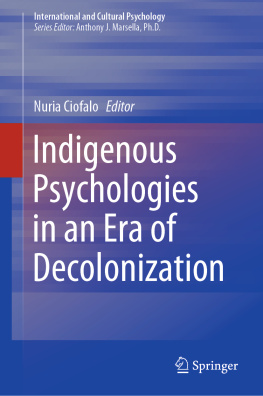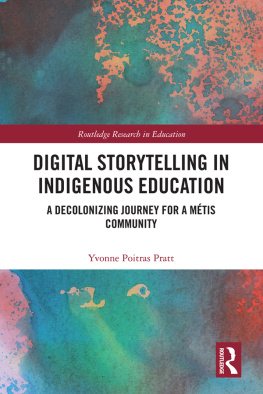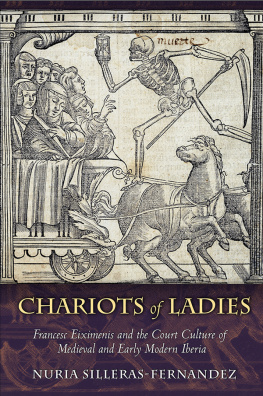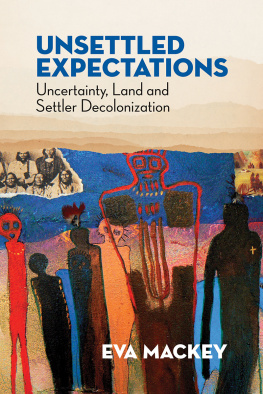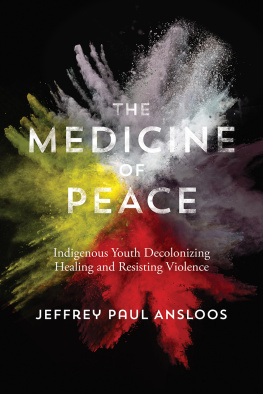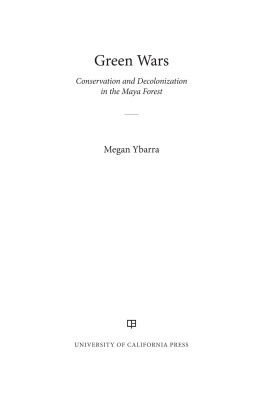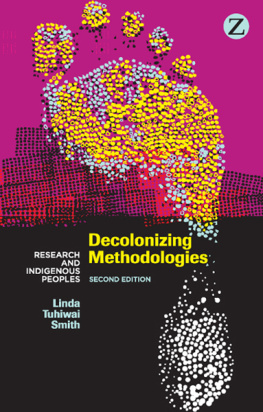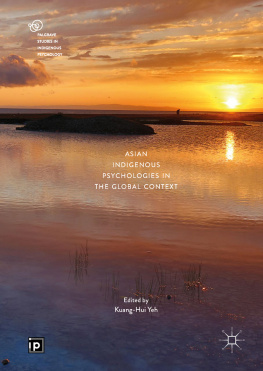Nuria Ciofalo - Indigenous Psychologies in an Era of Decolonization
Here you can read online Nuria Ciofalo - Indigenous Psychologies in an Era of Decolonization full text of the book (entire story) in english for free. Download pdf and epub, get meaning, cover and reviews about this ebook. year: 2019, publisher: Springer International Publishing, genre: Religion. Description of the work, (preface) as well as reviews are available. Best literature library LitArk.com created for fans of good reading and offers a wide selection of genres:
Romance novel
Science fiction
Adventure
Detective
Science
History
Home and family
Prose
Art
Politics
Computer
Non-fiction
Religion
Business
Children
Humor
Choose a favorite category and find really read worthwhile books. Enjoy immersion in the world of imagination, feel the emotions of the characters or learn something new for yourself, make an fascinating discovery.
- Book:Indigenous Psychologies in an Era of Decolonization
- Author:
- Publisher:Springer International Publishing
- Genre:
- Year:2019
- Rating:4 / 5
- Favourites:Add to favourites
- Your mark:
- 80
- 1
- 2
- 3
- 4
- 5
Indigenous Psychologies in an Era of Decolonization: summary, description and annotation
We offer to read an annotation, description, summary or preface (depends on what the author of the book "Indigenous Psychologies in an Era of Decolonization" wrote himself). If you haven't found the necessary information about the book — write in the comments, we will try to find it.
Indigenous Psychologies in an Era of Decolonization — read online for free the complete book (whole text) full work
Below is the text of the book, divided by pages. System saving the place of the last page read, allows you to conveniently read the book "Indigenous Psychologies in an Era of Decolonization" online for free, without having to search again every time where you left off. Put a bookmark, and you can go to the page where you finished reading at any time.
Font size:
Interval:
Bookmark:
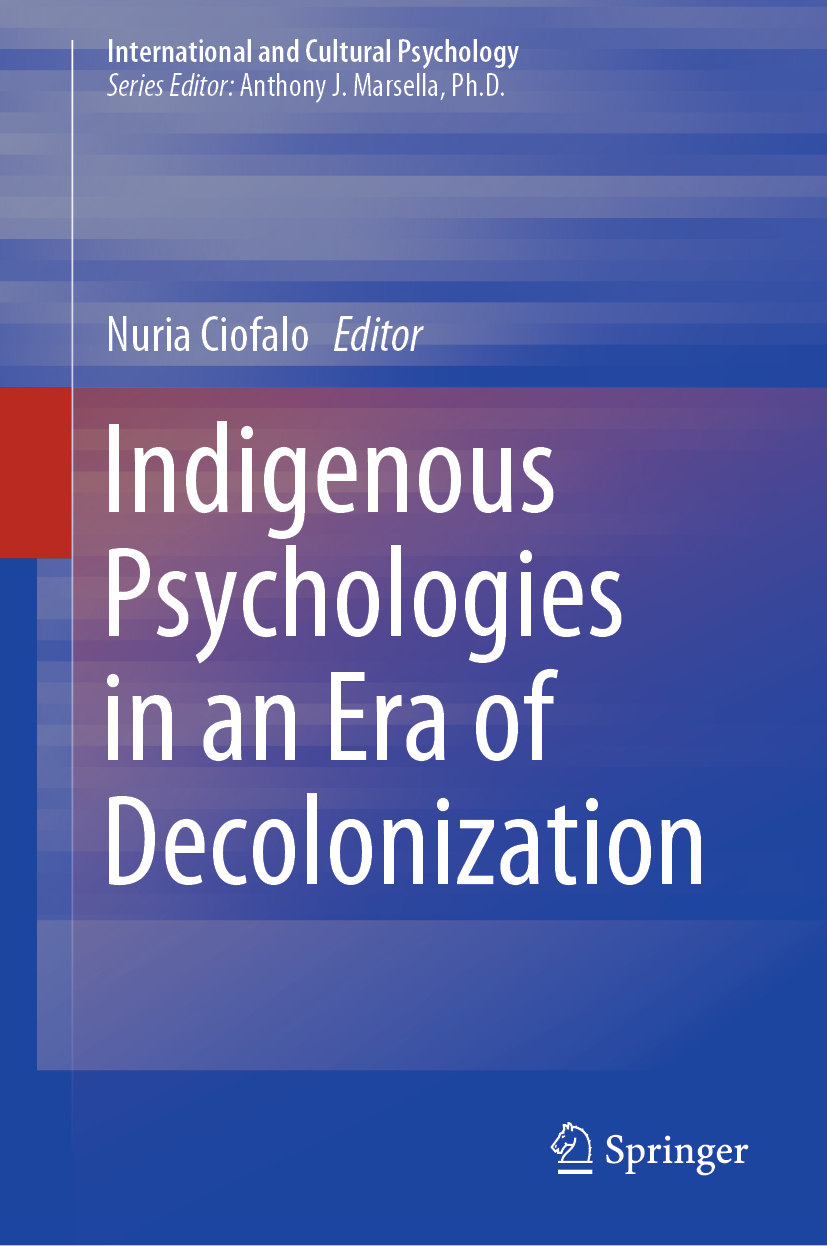
Explores problems and challenges to mental health, psychosocial wellbeing, human growth and development, and human welfare that are emerging from our contemporary global context. It advances in psychological knowledge regarding the nature and consequences of the many social, cultural, economic, political, and environmental events and forces that affect individuals and communities throughout the world.
The series covers areas like therapy, assessment, organizational psychology, community psychology, gender, child development, and specific disorders. In addition, it addresses major global challenges such as poverty, peace, urbanization, modernization, refugees, and migration. The series acknowledges the multidisciplinary, multisectoral, and multicultural nature of the global context of our lives, and publishes books that reflect this reality.
Publish your next book in this series! Send your manuscript to Series Editor: Anthony J. Marsella, marsella@hawaii.edu.
More information about this series at http://www.springer.com/series/6089

This Springer imprint is published by the registered company Springer Nature Switzerland AG
The registered company address is: Gewerbestrasse 11, 6330 Cham, Switzerland
This book emerged from four corners, (1) my interest and commitment to dedicate my life and vocation to the understanding of indigenous cosmogonies and praxes; (2) the conviviality forged with indigenous communities in Mexico and Hawaii; (3) intergenerational relationships with the Mayan Lacandon community of Lacanja Chansayab, and (4) the collaboration with young and adult leaders of the Lacandon Rainforest over 8 years.
I was born in a colonized country, Mexico, as a child of European colonizers who delegated the raising of their children to their indigenous domestic workers. I learned to love my Nahuat (Aztec) surrogate mother more than my biological parents. Becoming increasingly aware of the violent injustices caused by colonialism that have fortified the still existing racism against the peoples who inhabited the American continent before the Europeans arrived, I learned to deeply despise my parents, my family legacy, and myself. As Fanon and Memmi so clearly analyzed, the colonized personality of the Criollos (the colonizers children born in stolen lands) splits in two: one, the colonizers and the other, the colonized personality. Turbulent confrontations and tensions with the effects of this split, that helps to maintain a racist system for the benefit of the colonizers elite, nourished my deep interest to learn from indigenous cosmogonies and ways of life. As a child, I craved to spend time in the town of my indigenous caretaker, Ofe , who taught me to understand her Nahuat language and culture, and to love her family. My parents sent me to a German school built in the city of Puebla, where I was raised and where the Volkswagen plant settled. My parents hoped that this European education, intended to be for the children of the German plants White collar elite, would fortify my colonizers personality and win over the colonized in me. This education gave me a scholarship to earn a psychology degree in Germany. However, it only strengthened my doubts of the validity and applicability of this discipline in the indigenous communities in which I wished to practice. Several years later, I worked in the Isthmus of Tehuantepec in the state of Oaxaca relating with Zapotec children and families who were facing pervasive environmental impacts caused by the oil company owned by the Mexican government, Petroleos Mexicanos (PEMEX). Instead of treating families to heal their psychological suffering, I felt the need to build solidary relationships with these communities and fight injustice, human rights infringements, ecological degradation as well as to learn from their rich cosmogonies and praxes that have resisted these violent acts. A psychology learned in the West was of no use in these indigenous communities but only one that could be informed by their own culture. Coming to the conviction that I needed to acquire knowledge in systems rather than individual change as well as in indigenous psychologies, I went to Hawaii for graduate studies in community psychology, rural and regional planning, and to learn from the inspiring Hawaiian sovereignty movement.
Along the road toward the forging of academic and community collaborations that may trace possibilities for the co-construction of transformative systems change, I encountered mentors who guided me in this journey. Eduardo Almeida and Maria Eugenia Sanchez Diaz de Rivera taught me how to build deep horizontal relationships based on daily affective conviviality with the Nahuat community of San Miguel Tzinacapan, Puebla, in which they have lived and practiced for more than 40 years. I developed affective relationships with indigenous communities in Central, Northern, and Southern Mexico, presented at conferences with indigenous partners and friends, and wrote on indigenous womens ways of knowing in collaboration with Kumiai and Mayan Lacandon cultural healers.
My first encounter with the community of Lacanja Chansayab happened 8 years ago. This book emerged from a deep interest to learn from their Mayan indigenous psychologies. It is a collaborative project that is allowing us to learn from each other and to co-construct a vision of the world in which, as the Zapatistas have loudly voiced, many worlds are possible. One of the co-authors, Ernesto Chancayun, was 17 years old when I first met him. He introduced me to his community and has kept in touch over the years. Ernesto fulfilled his dream of earning a university education and staying in his community to make a difference. He shared this dream with me the first time I met him, when we were resting at the top of the Bonampak pyramids, inside the Temple of the Murals.
Font size:
Interval:
Bookmark:
Similar books «Indigenous Psychologies in an Era of Decolonization»
Look at similar books to Indigenous Psychologies in an Era of Decolonization. We have selected literature similar in name and meaning in the hope of providing readers with more options to find new, interesting, not yet read works.
Discussion, reviews of the book Indigenous Psychologies in an Era of Decolonization and just readers' own opinions. Leave your comments, write what you think about the work, its meaning or the main characters. Specify what exactly you liked and what you didn't like, and why you think so.

